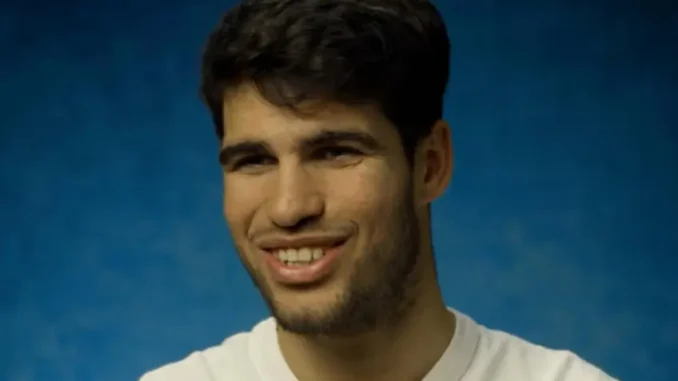
At just 22, Carlos Alcaraz has already carved his name into tennis history with four Grand Slam titles, six Masters 1000 crowns, and a meteoric rise to world No. 1. Yet, beneath the dazzling smile and explosive forehands lies a young man grappling with the relentless demands of professional tennis. In a revealing interview featured in his Netflix docuseries, Carlos Alcaraz: My Way, released on April 23, 2025, the Spanish sensation opened up about the emotional toll of his career, confessing, “Sometimes I feel like I am enslaved to tennis and that causes anxiety, frustration, doubts.” As he prepares for his second-round match against Dusan Lajovic at the Internazionali BNL d’Italia in Rome on May 9, Alcaraz’s vulnerability offers a poignant glimpse into the human side of a global superstar.
Alcaraz’s journey from a small village in Murcia to the pinnacle of tennis has been nothing short of cinematic. The three-part Netflix series chronicles his 2024 season, a year of triumphs like his French Open and Wimbledon titles, but also moments of profound struggle. After a heartbreaking loss to Novak Djokovic in the 2024 Olympic final, Alcaraz’s tearful interview with Spanish ex-player Alex Corretja laid bare his vulnerability. “I’ve taken steps backwards, like I’m not doing well mentally, I’m not strong,” he admitted after his 2024 US Open exit, a rare moment of candor for a player often seen as unflappable. These glimpses into his psyche reveal a young man wrestling with the weight of expectations while striving to preserve the joy that drew him to the sport.
The docuseries, directed by Jorge Laplace, paints an intimate portrait of Alcaraz’s life off the court. Scenes of him sharing meals with his family in El Palmar and joking with childhood friends highlight his deep-rooted desire for normalcy. “I’m the type who likes to spend time at home, which tennis doesn’t allow you to do,” he shared, reflecting on the sport’s grueling schedule. His mother, Virginia Garfia Escandon, emerges as a grounding force, prioritizing his happiness over relentless ambition. Alcaraz’s candidness about needing breaks—whether partying in Ibiza after the 2024 Paris Olympics or relaxing with friends post-Wimbledon—has sparked debate. “I don’t want to feel like a slave to tennis and not have time for myself,” he told Relevo in 2024, a sentiment that resonates with fans but has drawn scrutiny from tennis purists.
Former world No. 1 Carlos Moya, who coached Rafael Nadal until 2024, weighed in on Alcaraz’s philosophy, defending his right to live fully at 22. “It’s impossible to achieve what he has achieved without discipline and hard work,” Moya said, but added, “He’s living in the moment, has already won four Slams, which we sometimes forget. He deserves it.” Moya also pushed back against the notion that Nadal, often compared to Alcaraz, was a “slave” to tennis, insisting, “Rafa had a full life outside of tennis. I know he had his passions and enjoyed his free time.” Novak Djokovic, too, empathized with Alcaraz’s choice of words, noting at the 2025 Madrid Open, “It’s a bit of a harsh word, but I understand why he said it.”
Alcaraz’s openness about mental health sets him apart in a sport where stoicism often reigns. After an adductor injury forced him to miss the Madrid Open, he admitted to feeling “nervous the whole day” before his 2025 Indian Wells loss and even contemplated an extended break after Monte Carlo. “Right now my biggest fear of all is ending up seeing tennis as an obligation,” he confessed in the documentary, a fear that underscores his determination to carve his own path. His team, led by coach Juan Carlos Ferrero—whom Alcaraz calls a “second father”—and bolstered by new additions like Samuel López, supports his balance of ambition and downtime.
As Alcaraz takes to Rome’s red clay, where he seeks to reclaim the world No. 2 ranking from Alexander Zverev, his words echo beyond the court. His advocacy for players’ welfare, from supporting Sara Sorribes Tormo’s health-related break to joining a letter demanding fairer Grand Slam revenue distribution, reflects a broader mission. “I just really wanted people to enjoy watching it,” he said of the docuseries, which has garnered praise for its raw authenticity. With the French Open on the horizon, Alcaraz’s quest to “find joy in the suffering,” as he put it after his 2024 Roland Garros win, is a testament to his resilience—and a reminder that even champions are profoundly human.
Leave a Reply